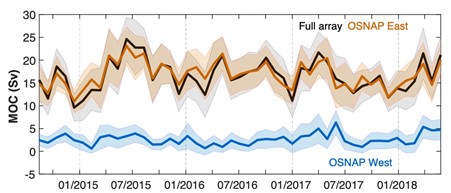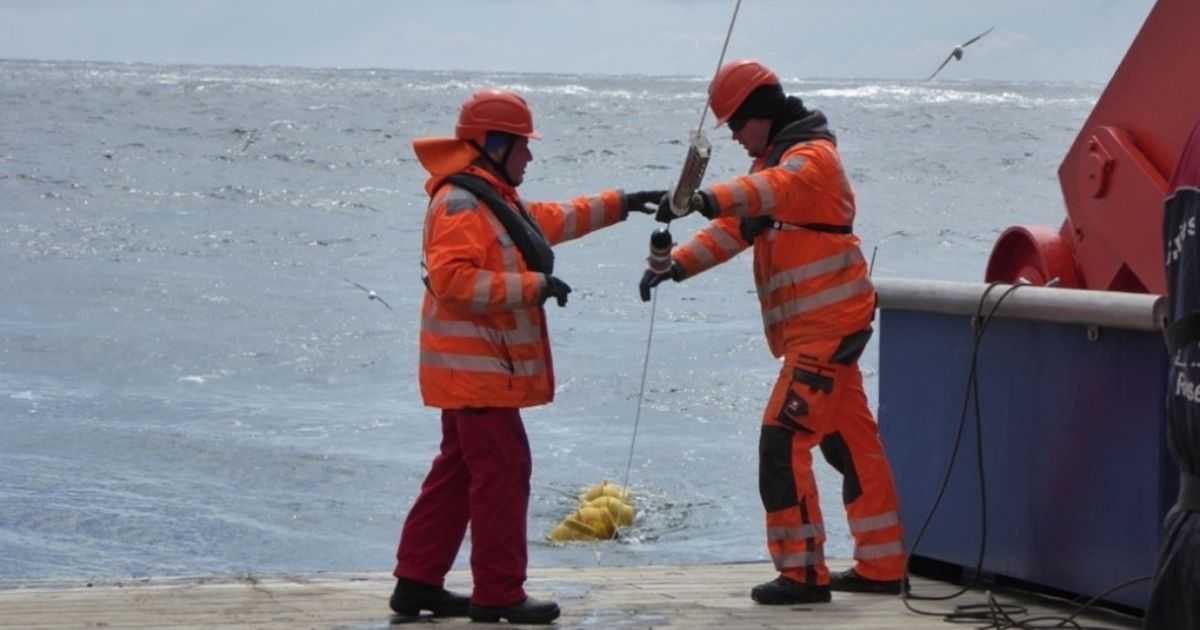Scientists discover that changes in the density of North Atlantic deep western boundary currents were not directly linked to the strength of the Meridional Overturning Circulation in 2014-2018
A new international study has cast doubts on the view that variations in the density of some of the deepest currents of the subpolar North Atlantic Ocean are caused by winter surface conditions and represent changes in the strength of the Meridional Overturning Circulation (MOC).
The study included the efforts of 15 research institutes and was led by Dr Feili Li and Professor Susan Lozier from Georgia Institute of Technology, in partnership with Professor Penny Holliday, from the National Oceanography Centre (NOC). Research published on 24th May 2021 in Nature Communications shows observations made over four years from 2014 in the subpolar North Atlantic reveal no sign of strong winter cooling at the surface of the ocean on the density of the deepest boundary currents found in the western regions of ocean basins. Surprisingly, the authors also found no visible relationship between changes in those deep western boundary currents and variations in the strength of the MOC.
 The strength of the Atlantic Meridional Overturning (MOC) as measured across the eastern and western sections of the OSNAP array.
The strength of the Atlantic Meridional Overturning (MOC) as measured across the eastern and western sections of the OSNAP array.
Knowledge of the physical processes that govern changes in the MOC are essential for accurate climate projections. The MOC brings vast amounts of heat and salt into the northern Atlantic via the Gulf Stream and North Atlantic Current. Changes in the strength of the MOC directly affect sea level, climate and weather for Europe, North America and parts of the African continent. Climate projections all predict a slowing of the MOC as a result of greenhouse gas emissions, with potentially damaging impact on coastal communities and land.
Previous analysis of models has led scientists to think that changes in the strength of the MOC are associated with changes in the density of the deep western boundary currents which make up the majority of the southward return flow of the MOC loop. In models, density can be strongly affected by a winter process called deep convection or deep water formation, where cold winds cool the surface water causing it to become very dense and sink to great depths (more than 2km). The relationship in models between convection, changes in deep western boundary currents and the strength of the MOC also underpins evidence from palaeoclimate proxies for periods of reduced MOC and low European temperatures.
In 2014 scientific equipment was placed in the subpolar North Atlantic (OSNAP) to observe these processes in real life. The surprising new results will stimulate a reconsideration of the view that deep western boundary changes represent overturning characteristics, with implications for future climate projections as well as the interpretation of past climate change.
Prof. Susan Lozier, overall lead of the international OSNAP programme said: “It is gratifying to see what an international community of oceanographers can achieve with a concentrated effort of collaboration and determination. Programs such as OSNAP and RAPID are blueprints for how oceanographers across the globe can collectively study the ocean’s role in climate change in the years and decades ahead.”
Prof. Penny Holliday, Associate Head of Marine Physics and Ocean Climate from the National Oceanography Centre commented: "it is incredibly exciting to see how new observations from the OSNAP array are accelerating our knowledge of how these major ocean currents work, so that we can be more confident in our understanding of past climate change and in future climate projections."
By National Oceanography Centre



